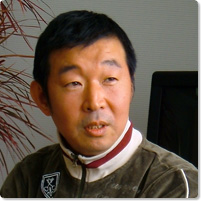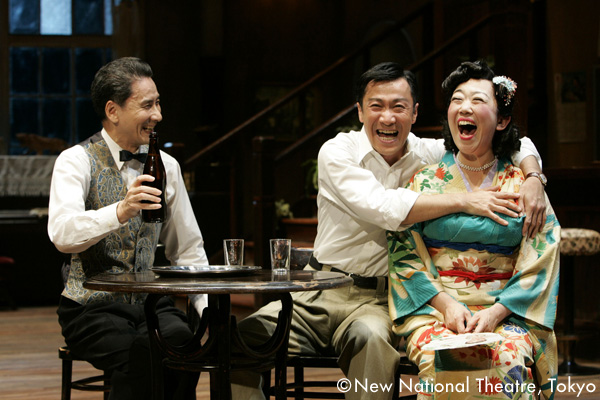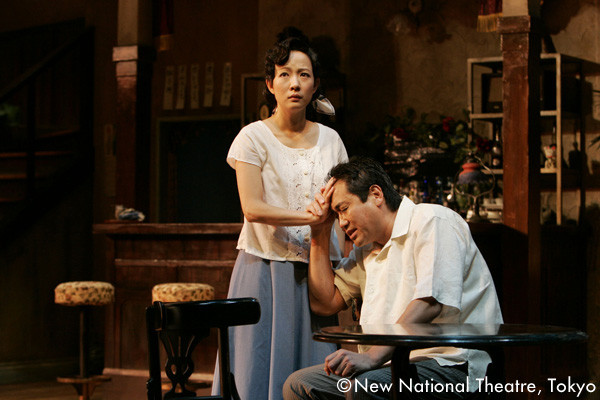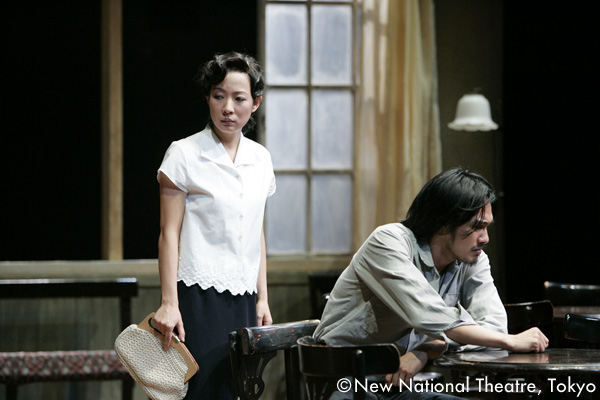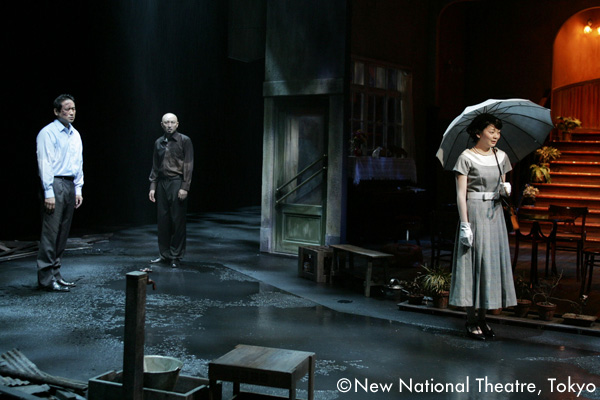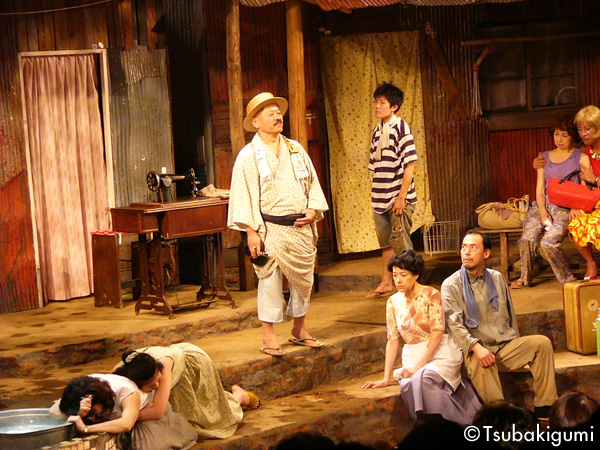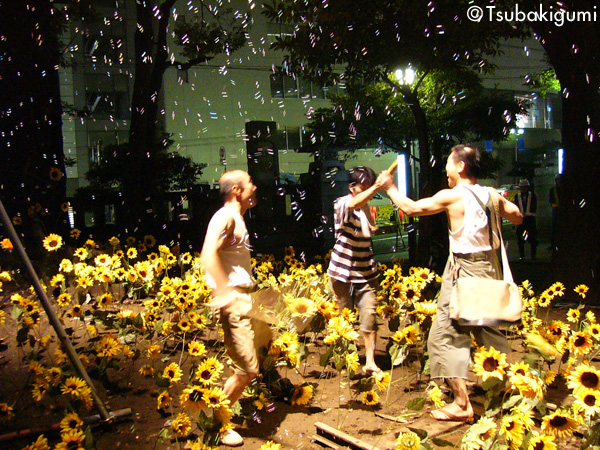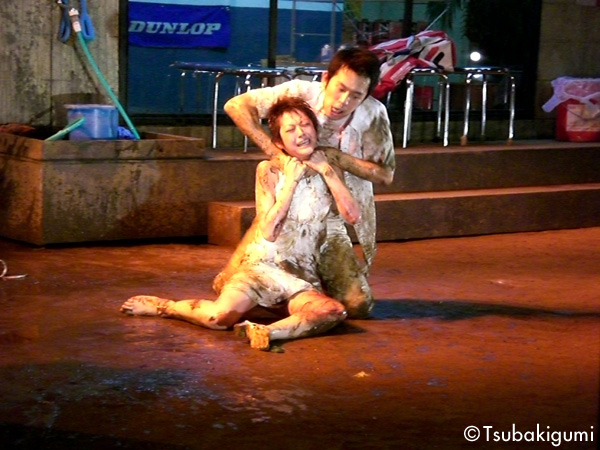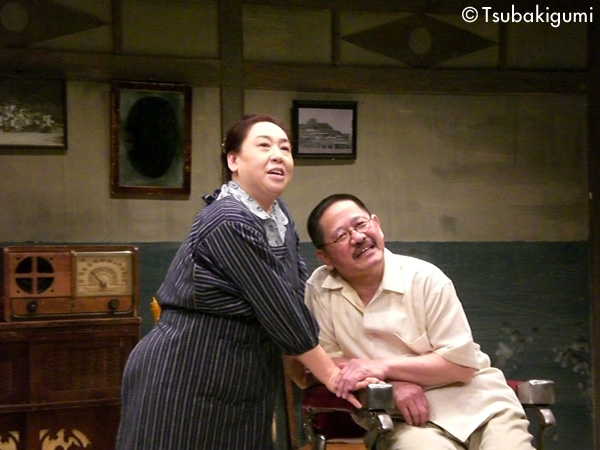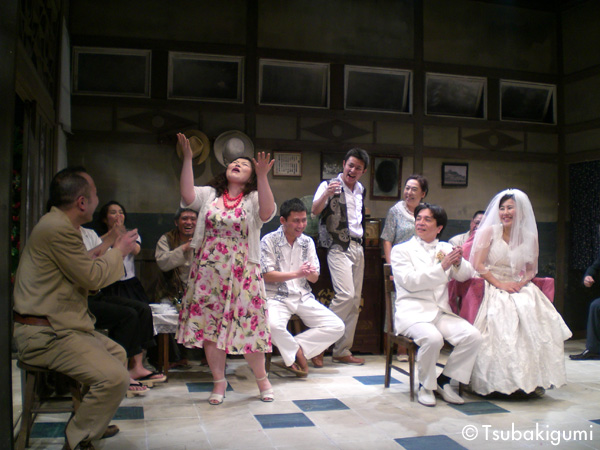A playwright anchored in a vivid cultural background
- I have heard that the Chong family used to live inside the Himeji Castle.
- It wasn’t actually inside but in shack built on top of the wall of the outer moat. It was a place where people without land just built their own shacks and lived as squatters just after the War. Most of them were poor Japan-resident Koreans and Japanese. My father built a house there and moved the rocks of the old moat wall to make a garden for it. My father said that it was land he bought, but that doesn’t seem likely considering that it had to be nationally owned land (laughs). Since the Himeji Castle is a National Treasure now registered under the World Heritage program, it means that my family used to live in a World Heritage site (laughs).
- There must have been a lot of interesting people living there.
- There were people like the ones we called “Mouse Man” who lived in a junked cars and there were spongers we called “gichu” (parasites). There were lots of these kinds of spaced out, strange characters that appear sometimes in my plays living around us there. Poor people who were poor and could also be clever or deceitful. I didn’t like them when I was a child, but now I think there were some interesting characters among them, strange but lovable people who in their own way were trying hard to live and get along. There was a nursery school, an elementary school and a middle school right in front of our house, and that is where I went to school. I am the fourth child in our family of five boys and for some reason I was the only one who lived away from the family with my grandmother. My grandmother’s house was in a shantytown where only Koreans lived on a hill a little higher than my father’s house on the moat wall. From that hill I could see the white walls of the Japan Red Cross Hospital, the chimney of the crematorium and the red brick wall of a prison. In one view there was life and death and crime and punishment in my neighbor.
- Like a microcosm of the world …
-
Yes. It was a wonderful shantytown. I got twisted sense of the world from living there with my grandmother, and while all my brothers were good in math and the sciences, I was the only one who pursued literature and the arts (laughs). Eventually my grandmother and I went back to live at my family’s house in the other shantytown on the moat wall. By that time I had become a grandmother’s child and I slept in the same room with her until I was in middle school and before sleep at night she would tell me stories about her hometown in Korea. And then she would say over and over, “I wish I could die.” Thanks to her, I got the idea from childhood that there wasn’t much to life, that life was pitiless.
My father had come to Japan [from Korea] at the age of 15. He wanted to get an education and make a living as an educated man, so he went to the Hiroshima Teacher’s School (present Hiroshima University). But he was drafted under the wartime student mobilization program in his second year there, and since he had good grades he was sent to the army’s Nakano Military [officers] School. I remember when I was a child there was a saber in our house and thought it strange that my father should have one. Later I learned that he had been a military policeman during the War. In my recent play Tatoeba No ni Saku Hana no Yo ni (Like a Flower Blooming on the Moor) there is a part about a Japan-resident Korean man who is a military policeman. That was an episode borrowed from my father. - What did he do after the War?
-
After the War he tried to go back to Korea with my grandmother and aunt, but the boat he had sent our belongings ahead on sank and our family lost everything we had. Deciding that it would then be impossible to return to Korea, my father started a refuse collection and salvaging business in Himeji.
Our house was full of lots of things he had salvaged, like a 8mm film camera and lots of books and magazines. I was always reading those books. One I remember in particular was Cuore’s Diary , an Italian children’s book about that I read when I was in elementary school. It is a story about children living in a dormitory, and I loved it.
My father used to collect the empty cans and cardboard from movie theaters, and once a month when he went to collect the fees from the theaters the whole family would go along and watch a movie from the second-floor gallery. We would bring a lunch along and eat as we watched. It was my mother who got to choose the films we saw, so they were always films about daily life or dramas about youth. Because of those childhood memories, I have a soft spot for old movie theaters. In fact, the old movie theater that is used as the setting for my new work Boku to Kare to Musume no Iru Basho (Me and Him and the Place that Daughter Is) is actually modeled after the old movie theater in Himeji. Sadly, it’s been torn down now. - You went through high school in Himeji and then entered Kyoto’s Doshisha University. What department did you study in?
- I majored in the Aesthetics and Art Theory Course of the Literature Department. At Doshisha you have to choose your major at the time of the entrance exam. The author Yasutaka Tsutsui was a graduate of Doshisha’s Aesthetics and Art Theory Course and all the students around me were big fans of his. But I was into Russian literature and the Japanese authors Sho Shibata and Kazumi Takahashi. I hadn’t read any of Tsutsui, so I didn’t really fit in. Although my parents were strongly against it, I dropped out of the university after my second year.
- Were you thinking of becoming a writer at that time?
- No. I’ve always just gone with the flow in my life and I never had any strong desire to become a writer or a playwright. I’m a bit embarrassed to say it, but I’ve never been the type to have ambitions of dreams (laughs).
- What did you do after dropping out of university?
-
I worked part-time and just watched movies all the time. When I was off work on the weekends I would watch a triple feature in Kyoto and then go down to Osaka to watch another triple feature. After that was over I would go back to Kyoto for an all-night five-feature run. Then the next day it was to Osaka again for another triple feature. I watch so many movies that sometimes the stories would get jumbled together. I guess it was a time when I was trying desperately to fill an emptiness in my life with movies. Visconti’s movie
Rocco and His Brothers
is a story about five brothers, which is the same as my family. So. I have an especially strong identification with it. When I wrote
Ningyo Densetsu
(the story of the fate of a family with six brothers that crossed the sea to live in a small town named Uchiumi and a woman named Kingyo who comes to the town) it was in part an homage to
Rocco and His Brothers
.
I am told that I had two older sisters who died before when I was an infant, and I’m sure that my parents wanted another girl. But, all that were born were boys (laughs).
From the darkness of the movie theater to the light of the stage
- After leaving Doshisha University you enrolled in film school Japan Academy Of Moving Images in Yokohama.
-
The more movies I watches the more I wanted see the world behind the screen. I thought it would be good if I could make a life working in filmmaking. I went to the film school for two years and then I went to work for the film studio Shochiku as an assistant in set decoration. At that time, I was invited by a Japan-resident Korean in the “Black Tent” theater company to take part in the “Red Classroom” workshops they were doing. Their slogan was “Anyone can do theater” and there were a lot of housewives and men who were theater amateurs attending, and I thought what they were doing was interesting. Kiyokazu Yamamoto directed the Red Classroom graduation performance and for some reason I was given the lead role. I couldn’t do well at all and I got a lot of direct criticism from Yamamoto. “You talk like a machine (not a human being),” he told me. I still remember his exact words so clearly. After that performance, Yamamoto said to me, “You’ll be joining the Black Tent now, won’t you.” And I found myself answering, “Yes.” You see what I mean when I say I’m the type who has always gone with the flow (laughs).
In Black Tent, I was impressed by the actress Kim Kumija. When I saw their performance of Saiyuki she was the only one not wearing a mask, and I remember thinking how beautiful she was. Like me, she was Japan-resident Korean. It is sad that she passed away in 2004. - Had you seen Black Tent performances before that?
- When I was in high school there had been a performance of Abe Sada no Inu (Sada Abe’s Dog) in Himeji. I went to see it alone and was I was very excited during the last scene when they opened the black tent to the outside world. I think that in the case of theater your first experience is important, and for me it was not Juro Kara’s Red Tent but Makoto Sato and Kiyokazu Yamamoto’s Black Tent. By the way, the first Red Tent performance I saw was Onna Cyrano (The Woman Cyrano).
- Shortly after joining Black Tent you wrote your first play, Beloved Medea (’86).
- C: There was a Black Tent program to encourage the careers new members called the Titanic Project and for some reason I was chosen to write the script. Then I was told be some of my seniors in the company, “Since you wrote the play, you should direct it.” It was really tough, because I originally had no intention of directing anything, and it meant that I had to put together a staff to do the production.
- But the fact that you were chosen to write was certainly because you had something special. And after entering the theater world through Black Tent, you formed the Shinjuku Ryozanpaku with Kim Kumija, whom we mentioned earlier, and Kim Sujin of the Jokyo Gekijo company in 1987 after leaving Black Tent. And after writing a number of outstanding works for that company such as Sennen no Kodoku (1988), Eizo Toshi (Cinecitta) (1990) and Ningyo Densetsu (1995), you went on to an independent career that has included wide-ranging work in small theater and even musicals. What seems to run through all of your works is the feeling that, “Yes, there are people like that,” and, “Yes, there are places like that,” and “Yes, there was a time like that.” It seems to me that the reflection in of your upbringing and the vivid backdrop of your native Himeji brings a unique “reality” to these feelings.
-
I used to think that my upbringing, stories about Japan-resident Koreans and writing about the people around me were things that I had to work into my writing as very unique interludes in order for them to be accepted. But, after the 1993 success of the movie
Tsuki wa Docchi ni Deteiru
(Where Has the Moon Come Out?), for which I was asked to do the screenplay based on the novel by Yan Sogil, it became quite common for Koreans, from both the North and South, to appear in Japanese movies. Now we have had the “Korean TV drama boom” also. The times have changed so that now it is completely natural for Koreans to appear in movies and plays and it doesn’t take any special effort on the part of the audience to accept them as characters.
Of course there is no need to feel humble about your being a minority, but there is also no need to emphasize it either. So, now I feel that it is OK if I just present these people naturally as life-size characters in my writing. It seems that many people think my playwriting has changed a lot since my Ryozanpaku days. But, I think that, although the pictures I portray may have changed somewhat, my own fundamental core hasn’t changed.
Being a “ Zainichi Korean” writer
- Is your nationality [citizenship] South Korean?
- Originally my nationality is “Chosen” [now North Korean], but I changed it to “Kankoku” [South Korean] when our play Sennen no Kodoku (A Thousand Years of Solitude) was performed in South Korea. After that my whole family changed to South Korean citizenship. My father has been though a lot of changes in his own life, and he decided to change to South Korean citizenship because he wants to be buried there when he dies. I think a lot of Japanese misunderstand, but the fact that many Japan-resident Koreans have North Korean citizenship doesn’t mean they are North Koreans. When Japan’s foreign resident registration law went into effect in 1947 all Korean nationals were registered as Chosen citizens, and after South Korea was established as a country in 1948, an increasing number of people changed to Kankoku citizenship. A lot of people still have Chosen citizenship just because they never made the effort to change to Kankoku citizenship. My family was originally from an area called Ch’ungch’ongnamdo not far to the south of Seoul. And, I believe that most of the Japan-resident Koreans who have Chosen citizenship were originally from what is now South Korea geographically.
- Among the early generation of Japan-resident Korean playwrights, Kohei Tsuka is well know. Has Tsuka ever been a writer that you were particularly conscious of?
- Actually, right now I am doing a play ( Boku to Kare to Musume no Iru Basho ) with Kenjiro Ishimaru, who used to belong to Tsuka’s theater company, but the only Tsuka plays I have ever seen are Netorare Sosuke (1982) that Ishimaru starred in and maybe one other. For me, “ Zainichi Korean” theater was [not Tsuka but] always Black Tent and Jokyo Gekijo.
- With your play Musume ni Kataru Sokoku (1990) Tsuka made his coming-out, admitting that he was Japan-resident Korean, but I heard that he had a painful experience in South Korea when his Atami Satsujin Jiken (Atami Murder Incident) was performed there and people found out that he couldn’t speak Korean.
-
I can’t speak Korean either, and the times have really changed, because I was received quite warmly [in South Korea].
It happens that a collection of my plays is being published in South Korea for the first time this December (2007), and it begins with the work Asian Sweets that I wrote for Kim Kumija and contains a number subsequent works like Ningyo Densetsu, Niju Seki Shonen, Shojo Shokashu (Collected Song for Boys and Girls), Fuyu no Saboten (Winter Cactus) and Aki no Hotaru (Autumn Firefly), which gives it a lot of variety in terms of style. And there have been a number of performances of my works in Korea too, such as Sennen no Kodoku and Ningyo Densetsu from my Shinjuku Ryozanpaku period. I was particularly surprised at the performance of Ningyo Densetsu which was held in a tent that seated only about 300, but 700 or 800 people showed up to see it. Also, Niju Seki Shonen, Shojo Shokashu was very well received in a production directed by Yuko Matsumoto of the Bungaku-za theater company using Korean actors. Lately there have been performances [of my plays] every year in South Korea, including Annindofu no Kokoro , the Konyaku-za company’s production of Ro wa Robot no Ro (Teto the Robot) and the Warabi-za company’s production of Hibiki . This year there is the National Theater of Korea production of Fuyu no Himawari (Winter Sunflower) planned. Times have changed and we are finally in an era when Japanese contemporary culture can be introduced freely in South Korea. - You write a wide variety of works but it is said that you never write about the wealthy, only about minorities.
-
That is the society that I was born and brought up in and I can only write about the poor people of humble origins. At times I would like to write something more stylish but I don’t think it would suit me (laughs). The men who lived around me when I was a child were street-wise, but they were also lived and worked hard day to day and enjoyed their lives. They seem cheerful normally but you know that on the inside there is a lot they are dealing with. That is the way that human beings live, and you can’t be unhappy all the time. I think that is how we go through our lives day by day. I think that as we get older we are able to accept the way things are. And, I find that as I have gotten older I feel a stronger need to turn my awareness to social themes.
I was born and raised in a world of contradiction and paradox, or perhaps I should say the paradox or discrepancy of growing up in the “upper-echelon Korean shantytown on the moat wall.” So when I write, it always becomes laden with the contradictions of society. When I just write naturally there will always be people appearing here and there who are the objects of discrimination, and there will be discriminatory expressions. I have been called the writer who uses the most discriminatory language in Japan (laughs). It used to be that I was writing unconsciously about those [discriminated] people, but now I have reached the age where I feel that I have to consciously and properly write about discrimination. - One of the new works you wrote this year on commission from the New National Theatre, Tokyo with the motif of ancient Greek tragedy (Andromache) is Tatoeba No ni Saku Hana no Yo ni , which you set as a story about Japan-resident Korean women working as hostesses in a dance hall in a desolate port town just after the War. They all have their scars from the wartime hardships but they manage to live cheerfully nonetheless. The director Yumi Suzuki said that you write plays that mix tragedy and comedy together. It seems that what is tragedy to some people can be comedy to other people with a different perspective. Wouldn’t you say that tragedy and comedy are reverse sides of the same coin? Just like comedy is almost always based on underlying discrimination.
- I think so, too.
- The comedy in your plays seems to be in part an effort to give something enjoyable to your audience. Is that largely because you are from the Kansai region, which has always been known for the abundance of its comedy?
- That is a strong element in it. We can’t live without laughter (laughs). There have to be at least three gags to make things complete (laughs). I grew up watching Yoshimoto New Comedy so the gags are almost verbose. In my generation Hachiro Oka and Kyo Hanaki were at the peak of their popularity, and I especially liked the Hanaki’s somewhat laid back plays.
- When Hachiro Oka presses, “You’re stupid, aren’t you?” Kyo Hanaki comes back with “How did you know.”(Laughs)
- For a long time I thought, “This guy is a genius.”
- That is a true theater experience.
- Yes, it is. And I think it is not just for me but a shared theater experience of all people of the Kansai region. It is the basic pattern of the fool and the needler.
- When you write plays do you have the consciousness of deliberately writing in the Kansai dialect?
- Tatoeba No ni Saku Hana no Yo ni was set in Kyushu so I used Kyushu dialect, but normally I want to use Kansai dialect. There aren’t many playwrights who write in Kansai dialect and there is a world that can only depicted in Kansai dialect, and I like the easy flow that the dialect can have. The has got to be a world that standard Japanese—as strange as that concept may sound—or shall I say the Kanto dialect, cannot express. So, as when I write in Kyushu dialect when the story is about Kyushu, I want to give a lot of importance to and respect the power of the words, or dialect, of the region where the story takes place. And I think that in fact this is one of the actual core elements of theater.
- Besides the easy flow of the Kansai dialect you just mentioned, there is also a rough, even violent side to it as well, isn’t there? Like when someone says an aggressive “ Dou ya! ” (What do you say to that!) to the other person.
- There is definitely a unique strength to the Kansai dialect. In expressions like, “ Ondorya! ” (You, bastard!). The dialect of the place where I was born and raised was actually closer to the Kawachi dialect, so it was easy for me when I was working the screenplay for Kishiwada Shonen Gurentai (1996, originally written by Riichi Nakaba, directed by Kazuyuki Idutsu).
- You have won a acclaim not only as a playwright for the stage but also as a script writer for film. You are on the cutting edge of the Japanese movie scene with works like Kishiwada Shonen Gurentai , which you just mentioned, and with the film that originally made you a name, Tsuki wa Docchi ni Deteiru , and Chi to Hone (2004, originally written Yan Sogil directed by Yoichi Sai).
- For me, theater and film are basically one and the same and there is no difference in the way I write for the two. In the end they are both portray the human condition. However the methods of expression are different and there are some things that each can and cannot do as media, so I am conscious of those aspects when I write. In the past I used to have a clear outline of the composition of a work before I wrote, but now I only decide on the beginning and end before I start and then it develops as I write. I am often asked for a synopsis but I resist by saying that I have never written in line with a synopsis and that I am no good at making up synopses (laughs).
- Some writers say that they get pictures that come to mind.
- In my case, yes, it is pictures that come to mind rather than lines of dialogue. Scenes like a heavy snow falling and someone trudging along pulling a cart. In the case of Tatoeba No ni Saku Hana no Yo ni where the setting was a dance hall, I had a clear image and wrote with a considerable amount of attention to detail, such as the position of a certain set of stairs in the hall. Early on I had worked in stage art, and although I am not very good, I paint as well. And, although I don’t do paintings [of scenes] and give them to the stage art people to work from, I do spend a lot of time talking with them about my ideas. With Boku to Kare to Musume no Iru Basho the stage setting was a movie theater and we spent a lot of time talking about what parts of the movie theater should be used as the stage for the play. If we made the lobby the stage for the play, everything would be too clearly defined and it wouldn’t be interesting, so we decided to use an empty lot at the rear entrance to an old movie theater as the stage setting.
- Now that you mention it, a lot of the settings of your plays seem to be open, public spaces.
- That may be true. In Korea they have a form of theater called Madang-Theater that is performed in public squares. So, maybe it is the Madang genes in my Korean DNA at work (laughs). I grew up in the isolated environment of the “upper echelon Korean shantytown on the moat” so basically that is the kind of setting that comes to mind.
- The search for one’s self or one’s identity is often a central theme in contemporary theater works, but I don’t find that to hold true in the case of your works.
-
I hate that “search for the self” type of play (laughs). Life has its ups and downs, but we are all alive, aren’t we? The poor don’t have existential crises. They have no time to ask “To be or not to be.”
Theater as Chesa – Shrine
- In an essay you wrote some time ago, titled “On Wandering – A Humble Spirit-honoring Service ( Chesa ) for Souls That Have Been Wandering” (From the essay collection Logic Game , 1992, Hakusuisha publishers) you said that theater is like a chesa . A chesa (*) is a uniquely Korean service for welcoming the spirits of the deceased, am I right?
- Yes. It is a unique Korean custom, a sort of religious [Confucian] rite. Today it isn’t usually done so late into the night, but when I was a child it would start at about midnight and we would repeat over and over the three kowtows to the spirits of our ancestors that return to the house on that night. For each repetition the positions of the chopsticks would be moved and rice would be set out for the spirits and then different dishes would be set out and finally tea is set out. It is all done as if the ancestors were actually there. The three kowtows would be repeated and then, after the spirits had left we could finally eat all the offerings that had been set out. For me, theater has a similarity with this chesa service.
- You mean that in the sense that you spread out offerings and welcome wandering souls for short period of communal time? In other words, theater is an offering of enjoyment to the countless souls wandering through urban life like spirits without family to welcome them with the chesa ?
- Yes. It may be presumptuous of me, but that is how I think of it and that may be why I try so hard to make it a worthy offering.
- You wrote that essay 15 years ago and it appears that your spirit hasn’t changed since then. I seems that you have continued to offer plays like chesa , bringing together the living and the departed souls to meet on the stage.
-
I think that as time goes on the presence of the dead has grown stronger [in my plays]. Partly it comes from the fact that I have gotten older myself, and more people around me have passed away. Also, the death of Kim Kumija was certainly a painful shock for me.
I turned 50 this year. But, my mental age hasn’t changed (laughs). People don’t change easily. When I was 15, I couldn’t wait to be 30, and I thought that when I reached the age I am now life would be all roses and all the promises of life would be fulfilled. But, it doesn’t happen that way. I’m 50 now and nothing has changed, and I have to apologize to the world for that fact (laughs). - But they say that for an artist, things really get interesting from their 50s.
- Perhaps so. With meat and with fruit, the real flavor comes out when it starts to ferment a bit (laughs). And, now that maturity is coming on, I have the feeling that I’d like to do something a bit more frivolous for a change (laughs).


